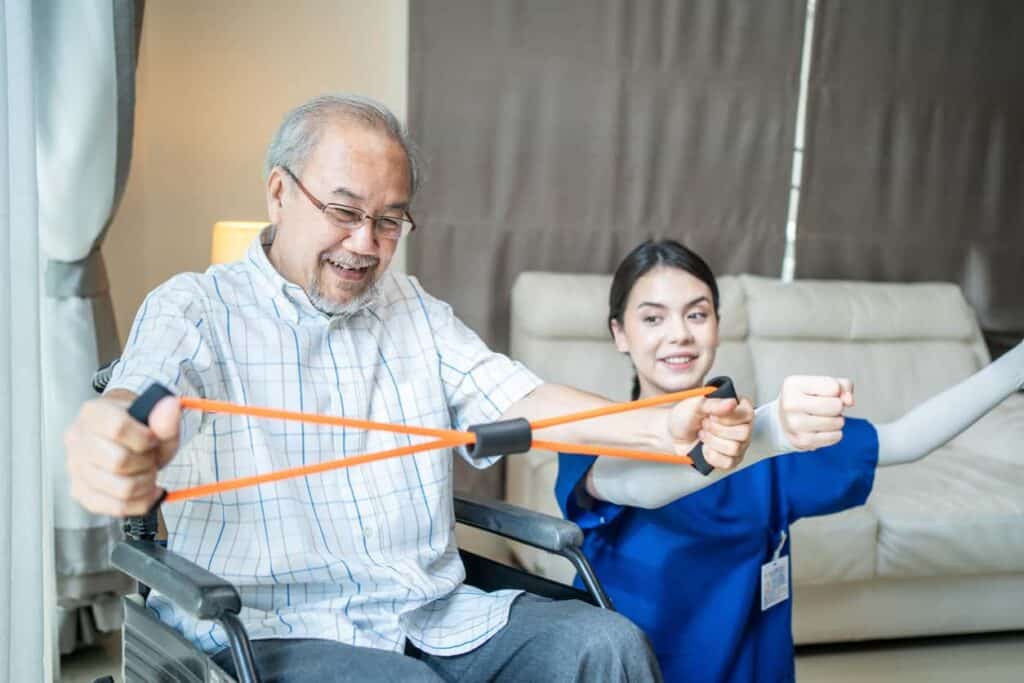When you have a loved one living with a life-limiting or chronic health condition, you will want them to receive the best possible treatment while being comfortable. Sometimes, your loved one may receive curable treatment, which has some severe adverse side effects. These side effects may affect a patient’s quality of life.
Palliative care comes in to help you and your loved one cope with their health condition. This specialized medical care helps improve your loved one’s quality of life, especially with a severe or chronic health condition.
Palliative care also includes easy access to emotional, mental, and spiritual support. Additionally, your loved one will receive help with activities of daily living that are uniquely suitable to their condition.
With palliative care, your loved one will be able to cope with the side effects, anxiety, and stress that accompany their illness.
This type of care provides advice and information about dying, death, advance finances, and care planning.
As a family, palliative care will help you come to terms with your loved one’s condition and assist you during these difficult times.
Palliative care also has programs that offer caregiver support, ensuring your loved one has the best care available at this crucial time in their lives.
With an ailing loved one, all you want is for them to be comfortable and minimize their suffering as they continue with their treatment. Palliative care incorporates a team effort to support patients, their families, and their caregivers.

Understanding the Scope of Palliative Care
When your loved one is living with a severe health condition, you may opt for palliative care. This type of care mainly focuses on relieving the stress accompanying a patient’s condition as they continue their treatment.
With palliative care, a specially trained team of nurses, doctors, and specialists works together to ensure your loved one lives a quality life despite the illness.
Palliative care mainly focuses on your loved ones’ needs and not on their prognosis and it’s appropriate at any stage of the illness.
In most cases, your loved one can access palliative care along with curative treatment. The team caring for your loved one will ensure that it controls the pain and treats other symptoms of the illness.
Additionally, palliative care affirms a patient’s life, incorporates a holistic approach, and regards dying as part of the living process.
Your loved one will have easy access to emotional, practical, and physical support at any time after receiving a terminal diagnosis of their condition.
Palliative care differs from individual to individual, and the care team must develop a custom care plan that addresses a patient’s health condition.

Key principles and goals of palliative care
If you are worried about whether palliative care is appropriate for your loved one, the following information will help you make an informed decision.
Palliative care principles and goals are adapted from the Last Acts, an organization that aims to improve palliative care for your loved one and describes the type of care your loved one should have as they cope with their illness.
Though this type of care is not limited to people nearing their end, the principles and goals embody the spirit of palliative care at any stage of a severe health condition.
These goals include:
- Respect your loved one’s preferences and needs and their family’s.
- Help your loved one understand their illness and what to expect as it progresses.
- Help you and your loved one work with their healthcare providers to plan and solve any issues that may crop up.
- Satisfies your loved ones’ preferences on where they want to live, receive healthcare, and the care services they want.
- Palliative care looks into your loved one’s emotional, social, spiritual, and medical needs. They can do this by offering pain-easing options, helping you and your loved one make necessary changes as the illness deteriorates, and ensuring they are not alone.
- Help your loved one cope with their fears and difficulties.
Principles of Palliative Care
There are several principles for successful palliative care. Palliative care integrates the overall care a person can receive and looks out for their loved ones. These principles include:
Pain Relief
Sometimes, physical pain might be an unfortunate part of your loved one’s health condition, especially during their end-of-life stage. Although pain is part of most health conditions, not all patients receiving palliative care experience pain.
Pain is usually multidimensional, and there is no single way of treating it. Pain relief targets your loved ones’ physical, social, spiritual, and psychological lives. As your loved ones approach their end-of-life stage, ongoing pain assessment and management are paramount.

Compassion and Empathy
Palliative care calls for compassion, empathy, and sensitivity towards your loved one during their illness. Sometimes, your loved one may need more than medical care; this is where empathy and compassion emerge during this critical stage in their illness.
Realize that your loved one’s needs and desires are uniquely theirs, and so the experience of their condition will differ from others. Their care providers will develop a care plan that will suit them.
Communication
Communication is essential to palliative care, as you must discuss all the care plan processes with your loved one. Communication between you, your loved one, and their care providers is essential for successful palliative care.
Communication should continue between all the parties involved, keeping everyone informed of the process and what to expect as the illness progresses. The palliative care team will help you set realistic goals and how to achieve them.
When you and your loved one have a clear line of communication, you know their wishes, can communicate the same to other family members, and be in a position to honor their final wishes when the time comes.
Excellent Care
Your loved one deserves excellent medical, allied health, and nursing care that is appropriate and available. A palliative care provider will develop a care plan allowing your loved one’s nurses, and caregivers to provide consistent and excellent medical care, which will lessen medical emergencies and handle them when they arise.
Developing a care plan helps reduce distress among your loved one and your family, as it makes clear a patient’s wishes and enables you to deal with any unexpected issues as they crop up.

Offers Great Support For Seniors and Their Families
Whether your loved one accesses palliative care at the hospital or from the comfort of their homes, its success or failure will mainly be due to the support they have from their family and friends.
As a family, you need to prepare for the end, as sometimes death may be inevitable, and knowing what to expect will help you cope. Palliative care ensures that you have appropriate support during this challenging time as a family.
Differences between palliative care and hospice care
| Palliative Care | Hospice Care | |
|---|---|---|
| Focus |
|
This type of care focuses on improving the quality of a patient’s life when the possibility of a cure is no longer viable or when the burden of the condition’s illness outweighs its benefits. |
| Recipient | This type of care offers resources for patients with severe and life-limiting medical conditions. These conditions may include:
|
Your loved ones’ doctor may enroll them for hospice care when they think they have less than six months to live. (Medicaid and Medicare may cover this care.) |
| Curative care | Your loved one can simultaneously access and receive curative, therapeutic care. | Your loved one will not receive curative care while under hospice care for their specific health condition. Hospice care ensures a patient receives medicine that enhances their quality of life. An example of these medicines includes anxiety and high blood pressure. |
| Services |
|
|
| Care Setting |
|
|
| Care Providers |
|
|
| Payment Methods |
|
|
| Care Duration | Your loved one can receive palliative care for as long as they need it. You can talk candidly with their doctor about the level of care that will best suit your loved one. |
Your loved one’s doctor will initiate hospice care when they have reason to believe a patient has less than six months to live. Sometimes, a patient may outlive these six months; when this happens, their doctor will extend their hospice care. If this is the situation, you can talk with your loved one’s doctor and let your loved one have two 3-month benefit periods followed by 2-month unlimited benefit periods. You should note that hospice care is not the final care, as your loved one can leave hospice care when their condition improves or if they decide they wish to return to hospice care later or resume curative care. |
Palliative Care Services and Support
Integrating palliative care into your loved one’s care plan ensures they are comfortable as they continue their treatment. The multidisciplinary nature of palliative care teams helps improve the quality of life for patients with chronic or life-limiting health conditions.
Currently, most chronic illness treatment has high morbidity and symptom profiles. Sometimes, this high profile rate is because your loved one’s doctors may have limited time to manage the symptoms as some conditions like cancer are very aggressive.
However, this is not the case with a multidisciplinary palliative care team, as it will help alleviate some of the burdens of the symptoms accompanying an illness.
Additionally, you will have someone to ask questions about your loved ones’ health or raise any concerns. A nurse or any other palliative care team member may address some health issues as soon as you raise them, ensuring your loved one is comfortable and in minimal pain during this stage of their illness.

Roles and responsibilities of different healthcare providers
One of the many benefits of palliative care is that a multidisciplinary team provides it with a different range of specializations, which goes a long way in managing your loved one’s chronic illness.
A palliative care team will work together to meet a patient’s physical, emotional, social, cultural, spiritual, and psychological needs. This tea will also help you and your family with any support you require.
The members of this multidisciplinary team include
General practitioners
Once your loved one leaves the hospital or after a physician diagnoses their illness, they will need to see their general practitioner regularly. A general practitioner will manage your loved one’s ongoing care while they can still live in their community.
Psychiatrists and Psychologists
These medical doctors provide mental health services to patients in both long-term and acute settings. A psychiatrist will help your loved one by delivering both cognitive and emotional health support while they are dealing with chronic or life-limiting illnesses.
A psychologist usually focuses on counseling, while psychiatrists perform other medical treatments and prescribe medications for mental health-related disorders.
You don’t have to worry about the cost, as Medicare usually covers these fees. However, you should ask if there are additional charges you may have to pay out of pocket.
Physicians and Surgeons
A physician is a specialist with specialized training in a particular medical field who will diagnose your loved one and give you relevant information about their medical condition. Examples of these specialists are:
- Neurologists: this specialist will diagnose and help your loved one in the treatment of nerve diseases
- Oncologists help in the diagnosis and treatment of cancer
- Orthopedics help in the diagnosis and treatment of bone- or muscle-related illnesses.
- Respiratory physicians help in the diagnosis and treatment of lung diseases.

Consultants
A palliative care consultant is a medical doctor trained to treat patients with chronic or life-limiting health conditions. A palliative care consultant usually deals with complex medical cases and primarily works with patients at hospitals or residential care homes with a dedicated and functioning palliative care unit.
Nurses
A palliative care nurse will manage most of your loved ones’ ongoing treatment and care while receiving palliative care in a hospital or at home. A nurse will assess, diagnose, plan, evaluate care, and administer your loved one’s treatment and medications.
A palliative care nurse will also speak with you and your ailing loved one about their health issues and what you need to do to manage their medical condition and continue living in the comfort of their home.
Dieticians and Nutritionists
Their role in palliative care is to assess, plan, evaluate, and implement interventions related to your loved one’s dietary needs. A dietician will include a therapeutic or regular diet to benefit a senior’s needs.
Additionally, a nutritionist will formulate a diet focusing on your loved ones’ medical needs while providing nutrition and dietary education for some health conditions, like diabetes.

Physical Therapists
In palliative care, physical therapists play a crucial role as they develop and help implement a care plan. This care plan helps patients with physical challenges like mobility, joint health, balance, coordination, and strength.
Occupational Therapists (OT)
The role of an occupational therapist is to plan, develop, evaluate, and provide care for patients with issues with their ability to perform activities of daily living like bathing and dressing.
An occupational therapist will help your loved one retain most of their independence even as they struggle with their medical condition.
An OT will help your loved one use assistive devices and assist you and other family members in providing a safe home environment for your loved one’s use.
Social Workers
A social worker will liaise between your loved one and the health care providers, ensuring the smooth continuity of their care even after discharge from the hospital. Social workers will also help you access local community resources, advance directives, and health insurance for your loved one.
Caregivers
A caregiver can be paid or non-paid and assists your loved one when facing
challenges. A family member or an in-home caregiver will visit your loved one regularly to help them manage the symptoms of their illness and assist them in carrying out activities of daily living.
Some caregivers usually provide 24/7 nursing care, especially to patients who require high support to live a quality life. This type of caregiver will help your loved one with bathing, feeding, toileting, managing their medication, and providing companionship.
Other caregivers may have a less intense role if the person they are caring for is independent but needs assistance with tasks like shopping, driving to appointments, and light housekeeping chores.

Volunteers
In most cases, palliative volunteers are family or community members who will come in and help your loved one for free. Local palliative care service providers usually recruit and train these individuals to help them offer practical assistance, run errands around their loved ones’ homes, and offer emotional support.
If a family member supports a loved one living with a life-limiting health condition, they can undergo training under the local volunteer program. Doing this ensures your ailing loved one gets the support they require during these challenging times and from a person with whom they are comfortable.
Holistic care approach addressing physical, emotional, and spiritual needs
Palliative care incorporates a holistic approach that addresses your loved one’s emotional, spiritual, and physical needs.
This approach doesn’t only look into your loved one’s mental well-being but also considers the whole person and what they require to lead a fulfilling life even as they struggle with their illness.
One thing to know is that your loved one’s road to recovery and mental health will significantly differ from that of another individual with the same health condition. Your loved one’s age, culture, gender, faith, language, life experiences, relationship status, beliefs, and sexual identity will play a vital role in their recovery journey.

Benefits of Palliative Care for Seniors
The goal of palliative care for your loved one is to improve the quality of their lives, especially when living with a chronic or severe medical condition.
Palliative care also supports the family, ensuring they can understand and help their loved ones during these challenging times. Your ailing loved one will access the following benefits when under palliative care:
- Improves the quality of their lives.
- The palliative care team will offer symptom and pain management, ensuring the comfort of your loved one.
- Reduces the risk of depression in seniors with severe or terminal health conditions.
- Increase the patient’s lifespan
- Offer support in decision-making
- Offer caregiver and family support.

Understanding Eligibility Criteria for Palliative Care
Although palliative care started with patients with incurable cancer, it has evolved. Today, your loved one will qualify for palliative care when they are living with a severe illness or a non-terminal health condition.
A senior can benefit from palliative care if they are living with
- Stroke
- Chronic Obstructive Pulmonary Disease
- HIV/AIDS
- Congestive Heart Failure
- Advanced liver conditions
- Advanced kidney conditions
- Parkinson’s disease
- Alzheimer’s disease, and other forms of dementia.
Although deciding to pursue palliative care is a decision you have to make as a family, health professionals have criteria they use to assess if your loved one needs the care. The requirements will solely depend on the person assessing your loved one and include:
General Hospitalization Criteria
A health professional may recommend palliative care for your loved one under this category when they notice:
- Declining ability of a patient to care for themselves
- Multiple or several hospitalizations
- Huge weight loss
- Extreme patient distress
- Symptoms that are proving difficult to control
- Caregiver distress or burnout.
Intensive care unit (ICU)
In this category, your loved one must have:
- At least two or more ICU admissions during a specific hospitalization period
- They have been under ventilator use for a long time
- Multiple organ failure
- If your loved one is in a nursing home and has severe health concerns like heart failure leading to ICU admissions.

Emergency room (ER)
To qualify under this criteria, your loved one must
- Have had multiple hospitalizations for the same health condition
- If they have enrolled in home health or hospice care previously
- If they have a do-not-resuscitate order
Oncology criteria
This category includes:
- First or second-line chemotherapy failure
- Poor performance status
- Progressive brain metastases, especially after radiation
- Painful cancer spread (bone metastases)
- If your loved one requires pain management intervention
How To Find Easily and Access Palliative Care Near You
The following national resources will help you effortlessly find and access palliative care for your loved one in your area:
- Getpalliativecare.org
- National hospice and palliative care organization
- Palliativedoctors.org
- The American Academy of Hospice And Palliative Medicine(AAHPM)
Palliative Care for Specific Conditions
You can seek palliative care as an option for your loved one for various health conditions. Some of these conditions may include
Cancer (Oncology) Palliative Care
Palliative care has a significant impact on cancer patients as it helps improve the quality of their lives by treating their symptoms.
With cancer, palliative care usually varies depending on the following:
- Symptoms of cancer
- Type of cancer
- Patient age
- Treatment options
- Prognosis
For example, if your loved one just had a recent cancer diagnosis, palliative care will help them manage the side effects of radiation or chemotherapy. Palliative care will also help a patient recovering from surgery.
As a family with a cancer patient, palliative care will help you cope with anxiety and depression and plan for your loved one’s future.
Additional benefits of palliative care for cancer patients include support for the physical side effects of cancer. These side effects may include:
- Fatigue
- Pain
- Nausea and vomiting
- Loss of appetite
- Sleeping problems
- Sexual health challenges
- Breathing problems.
Palliative care for these physical side effects of cancer may include:
- Anti-nausea medicines
- Nutritional help
- Physical therapy
To help your loved one cope with the physical side effects of cancer, you can consult with the following:
- Palliative care specialist
- Sleep specialist
- Physical therapist
- A nutritionist or a dietician
You must seek emotional support when your loved one is diagnosed with cancer. Strong emotions like anger, frustration, and sadness come with cancer. These emotions can make you and your loved one feel anxious, stressed, or depressed.
Palliative care options for you and your loved one can include mental health support. Your loved one can access counseling, meditation, medication assistance, and exercise efficiently.
A psychologist or a counselor may suggest that your loved one enroll in activities that help reduce stress, like yoga, meditation, music, arts and crafts, or joining a group of other cancer patients.

Palliative care for cardiovascular diseases
Cardiovascular disease will affect your loved one’s life, making it almost impossible to lead everyday and quality lifestyles. Some of the most common cardiovascular diseases include:
- Heart failure
- Stroke
- Coronary artery diseases
- Aortic stenosis.
Palliative care will help your loved one as it will help ease their pain and other symptoms. You and your loved one will easily access emotional and mental health support.
Additionally, if you have any questions before deciding your loved one’s condition, you can ask the palliative care providers for advice.
Palliative care for dementia
Dementia usually has a significant impact on a person’s
- Memory
- Behavior
- Language
- Cognition
- Judgment
Palliative care will help with the treatment of your loved one’s anxiety that accompanies dementia. As dementia progresses, you may have to make difficult decisions regarding their care. But with palliative care, you will know you are making the right decision as an entire team of professional health providers is guiding you.
Palliative care for COPD
Chronic Obstructive Pulmonary Disease (COPD) is a respiratory health condition that causes shortness of breath and coughing. Palliative care will help your loved one as it will treat their discomfort, insomnia, and anxiety associated with difficulty and shortness of breath.
Your loved one will receive lifestyle training, like quitting smoking if they smoke.

Conclusion
Facing and supporting your loved one as they struggle with a chronic illness can be one of the most challenging tasks. You need resources to help you better understand your loved one’s condition and what to expect if it’s a progressive condition.
Palliative care ensures your loved one has easy access to curative care and all the support they require. Seeking palliative care is not a sign of giving up on your loved one; rather, it’s one way of ensuring they are comfortable as they battle with their illness.
Since palliative care is a team effort, you will be better positioned to make informed decisions regarding your loved one’s care.
At Amy’s Eden, we encourage you to contact us if you need palliative care services for your loved one. Our caregivers are compassionate and can help your loved one live and enjoy their golden years in comfort. You can contact us and let us help you and your loved one during these challenging times.




